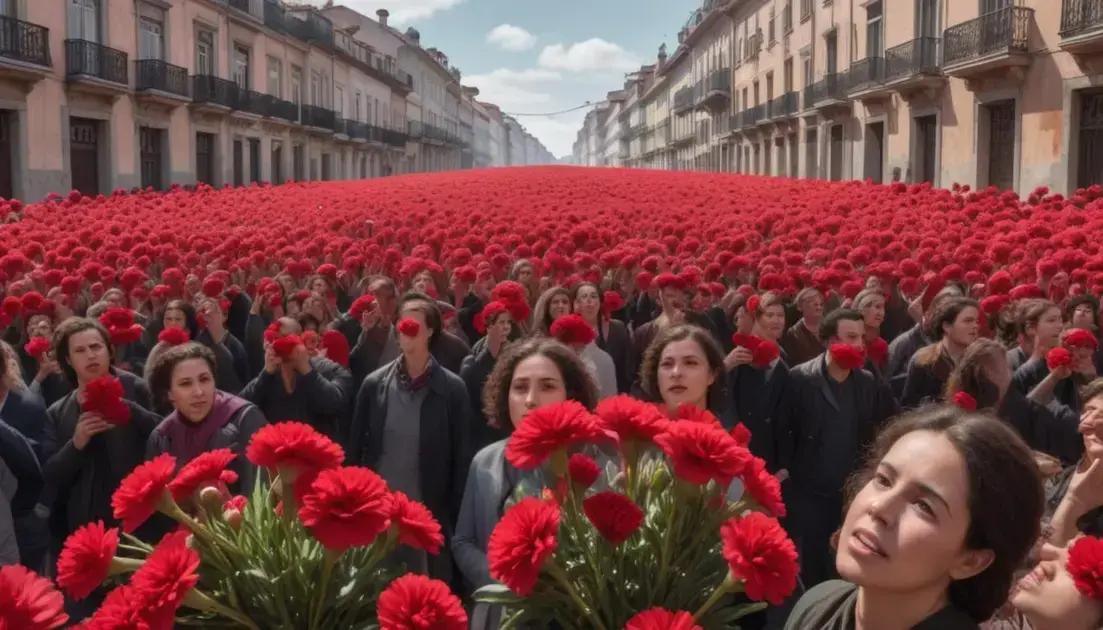
Carnation Revolution: The Peaceful Fall of Dictatorship in Portugal
The Carnation Revolution, occurring on April 25, 1974, was a peaceful uprising in Portugal that ended decades of dictatorship. This movement emphasized the power of unity, communication, and political engagement, leading to significant democratic reforms and the establishment of a new constitution. The events showcased how non-violent actions could bring about change, inspiring future generations to value their rights and freedoms.
Carnation Revolution marked a significant turning point in Portugal’s history, where a peaceful uprising restored democracy. Are you curious about how this unfolded? Let’s dive in!
Background of the Carnation Revolution
The Carnation Revolution happened in Portugal on April 25, 1974. This peaceful movement ended a long dictatorship led by António de Oliveira Salazar. For almost 50 years, people lived under harsh rules and had limited freedoms.
The revolution started with a military coup. But it was not like other coups. This one was peaceful. Soldiers brought flowers instead of weapons. People placed carnations in the barrels of rifles.
Many Portuguese citizens supported the military. They were tired of the oppression and wanted change. The simple act of placing flowers in guns showed the world their desire for peace.
This event greatly changed Portugal’s future. It opened the door for democracy. New leaders emerged, and people began to enjoy their rights and freedoms once again. The Carnation Revolution inspired many other movements for democracy worldwide.
Today, we remember this day as a symbol of hope and change. The flowers represent the struggle for freedom. The Carnation Revolution teaches us that change can happen without violence.
Key events during the Revolution
During the Carnation Revolution, several key events shaped the outcome of this historical moment. One major event was the April 25, 1974 coup. The military, led by the Armed Forces Movement, took control without much violence.
Another important moment was the radio broadcast that announced the revolution. This broadcast united people across the country. Many listened in surprise and hope, excited for a change.
As the day went on, people filled the streets. They waved carnations in support of the soldiers. This show of unity was remarkable and inspiring. No one expected such a peaceful gathering.
By afternoon, the dictatorship began to crumble. Salazar’s government lost control quickly. People celebrated in the streets and began to feel free.
One of the standout events was the takeover of important buildings. Soldiers and civilians worked together to secure key locations. They made sure the government could not fight back.
The day ended with a sense of relief and joy. It marked a new chapter in Portugal’s history. Citizens finally saw a path towards freedom and democracy.
Impact on Portuguese democracy
The Carnation Revolution had a huge impact on Portuguese democracy. After years of dictatorship, people finally felt free. They could express their thoughts and choose their leaders.
One major change was the new Constitution. It was adopted in 1976 and ensured basic rights for all citizens. This included freedom of speech and the right to vote.
Along with the new Constitution, Portugal saw a rise in political parties. Citizens could join and support the parties that matched their beliefs. This created a healthy political debate.
Democratic elections became the norm after the revolution. Citizens now had the power to vote for their government. Each election offered a chance to influence the future.
The revolution also inspired social movements. Women and young people began fighting for their rights. They worked hard to change laws and improve lives.
Portugal’s democracy has grown since then. The country has become stable and prosperous. Today’s democracy reflects the hope and determination of the revolution’s heroes.
Lessons from the Carnation Revolution
The Carnation Revolution teaches us many valuable lessons about change. One big lesson is the power of peace. The revolution showed that people can make a difference without violence.
Another important lesson is unity. During the revolution, everyone came together for a common cause. Soldiers and civilians worked side by side, showing how cooperation leads to success.
Engagement in politics is crucial. Citizens who care about their country can drive change. The revolution reminded people that their voices matter. Voting and participating in democracy are key to a thriving society.
Communication played a vital role as well. The radio broadcasts spread news quickly. This helped unite citizens and strengthen their resolve.
Lastly, history matters. Understanding past struggles helps avoid repeating mistakes. Remembering the Carnation Revolution inspires new generations to fight for justice and freedom.
Conclusion
In conclusion, the Carnation Revolution stands as a powerful example of how peaceful change leads to freedom and democracy. It taught us the importance of unity, communication, and active participation in politics. By working together, citizens can create a brighter future for their country.
The lessons learned from this revolution are still relevant today. They encourage us to speak up, join hands, and stand for what is right. Remembering this historical event inspires hope and motivates new generations to continue the fight for justice. Ultimately, the Carnation Revolution is a reminder that positive change is possible through peaceful means.


